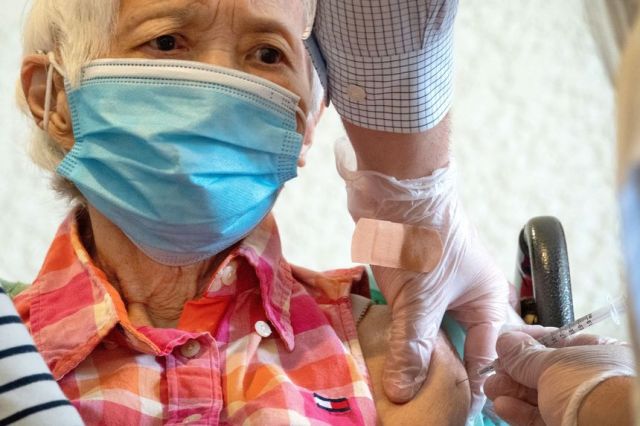
There’s growing evidence that inoculation confers significant protective benefits. Covid vaccines enormously reduce the risk of death and hospitalisation in those who have been infected by the Coronavirus. But could they also help protect seniors against dementia and Alzheimer’s disease? There’s reason to hope so.
Growing evidence indicates that seniors who get vaccinated against illnesses such as tetanus and even the flu are much less likely to develop Alzheimer’s, the leading cause of dementia, characterised by a build-up of amyloid plaque and tau tangles in the brain. Scientists don’t completely understand why, but many hypothesise that vaccines generate a systemic immune response that can reduce inflammation in the brain, which results in neuron loss and cognitive decline.
Among the first pieces of evidence was a 2001 study that tracked roughly 3,600 Canadians over 65. After adjusting for age, sex and education, the researcher found that past vaccinations for diphtheria/tetanus, poliomyelitis and influenza were associated with a 59%, 40% and 25% lower risk for Alzheimer’s, respectively.
The study had shortcomings. The differences discovered between the vaccinated and unvaccinated groups could have been due to confounding variables. People who get vaccinated, for instance, may also be more likely to get regular check-ups and suffer fewer underlying conditions like diabetes that increase the risk for Alzheimer’s.

But more-recent studies controlled for these factors and still found a strongly beneficial association between vaccines and Alzheimer’s. A research article published in the Journals of Gerontology in April examined the link between Alzheimer’s and the Tdap (tetanus, diphtheria and pertussis) vaccine. By using health records from the Veterans Health Administration and a large database of private medical claims for seniors over 65, researchers could adjust for variables such as demographics, health-services utilisation, health conditions and medications. After these adjustments, they found that seniors who had received the Tdap vaccine had a 42% lower risk of developing dementia than those who hadn’t.
The BCG vaccine for tuberculosis is mostly distributed at birth in developing countries. But it is also a common (though not the only) therapy for early-stage bladder cancer. Comparing bladder-cancer patients treated with BCG with those who weren’t can eliminate confounding effects since patients aren’t self-selecting into either group.
In a study published this spring in the journal Vaccines, researchers in Israel and the U.S. examined health records for some 12,185 bladder-cancer patients treated in both countries from 2000-19. They found that patients over 75 who received BCG treatment had a 27% lower risk for Alzheimer’s some 3½ to seven years later.
“We attributed BCG’s beneficial effect on neurodegenerative diseases to a possible activation of long-term nonspecific immune effects,” the authors wrote. For instance, the BCG treatment increased the levels of anti-inflammatory cytokines, which could lead to an increase in beneficial T-cells that help regulate inflammation. The mRNA Covid vaccines have also been found to generate such cytokines.

Another study, from the Montefiore Medical Centre and Albert Einstein College of Medicine in the Bronx, published this spring in the Clinical Genitourinary Cancer journal, found that bladder-cancer patients who received BCG treatment had a 60% lower risk of developing Alzheimer’s and other dementias than patients who did not.
What about vaccines that are more common? A study last year sponsored by the National Heart, Lung and Blood Institute examined data from more than 5,000 people 65 and over who participated in a cardiovascular-health study. The researchers found that getting a pneumonia vaccine between ages 65 and 75 (the vaccine is recommended for adults over 65) reduced the risk of Alzheimer’s by 25% to 30% after adjusting for potentially confounding variables.
The study didn’t find a beneficial effect from the flu vaccine alone, but the effects could hinge in part on timing and frequency. Another study last year, from the University of Texas’s McGovern Medical School, found that seniors who received flu vaccines more often and got their first before they turned 60 were significantly less likely to develop Alzheimer’s. The flu vaccine generates a weaker immune response than many other vaccines, so perhaps repeated vaccinations are needed to have a positive effect.
It hasn’t been proved that vaccines actually reduce the risk of Alzheimer’s, but multiple studies using different designs and populations support this theory. It’s also unknown whether Covid vaccines may impart a similar protective benefit, but they trigger a strong systemic immune response like some of the other studied vaccines.

What’s more, Cleveland Clinic researchers this summer discovered that Covid infections “significantly altered Alzheimer’s markers implicated in brain inflammation,” suggesting that the virus could trigger changes in the brain that result in dementia similar to Alzheimer’s.
There’s still a lot scientists don’t understand about both Alzheimer’s and Covid. But one silver lining of the pandemic has been the increased attention paid to vaccines, including for common ailments like the flu and pneumonia. Some 80% of seniors have been fully vaccinated against Covid, and a similar share last year got the flu vaccine.
Who knows? Perhaps years from now many fewer people than expected will have developed Alzheimer’s, and we may have the Covid vaccines to thank.








